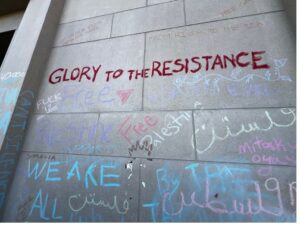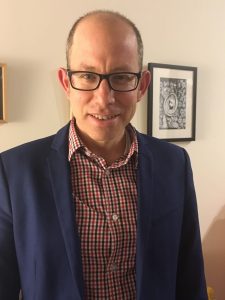Two members of the advisory board of the University of Minnesota’s Center for Holocaust and Genocide Studies have resigned in protest over the planned hiring of the center’s new director.
Karen Painter and Bruno Chaouat both resigned Friday evening after learning that Raz Segal, a professor at Stockton University in New Jersey, had been offered the position by Ann Waltner, the interim dean of the College of Liberal Arts, which is where the CHGS resides at the university.
Segal has studied the Holocaust in the Carpathians and in Hungary, and focuses his study of the Holocaust as a result of the decline of empires and the building of nation-states in Europe. The focus on nation-states is a central theme in an argument Segal makes that the Holocaust is not unique compared to other genocides.
“Dr. Segal has positioned himself on an extreme end of the political and ideological spectrum with his publications on Israel and Gaza, including an essay in which he accused Israel of genocide a week after the October 7 terrorist attacks,” Painter wrote in her Friday night resignation email to Provost Rachel Croson and Interim President Jeff Ettinger.
“The CHGS director is ideally a scholar whose principal area of research and public commentary is the Holocaust itself, and certainly should not be an individual publicly identified with extremist positions on the present Middle East war,” she wrote. “We need a center director who will bring our community together to understand how the Holocaust and other genocides occurred, not someone who blames Israel for the rape and murder of 1,200 civilians, and kidnapping of hundreds more.”
Segal wrote in Jewish Currents on Oct. 13, 2023, that Israel’s retaliatory strikes against Hamas positions in Gaza was “a textbook case of genocide.” This piece, as well as other interviews and writings he’s done on other outlets proved troublesome for some involved in the search.
“The assault on Gaza can also be understood in other terms: as a textbook case of genocide unfolding in front of our eyes,” Segal wrote. “I say this as a scholar of genocide, who has spent many years writing about Israeli mass violence against Palestinians.”
Segal has called the International Holocaust Remembrance Alliance (IHRA) definition of antisemitism a tool to suppress all critique of Israel; contends Israel is an apartheid state; and criticized the Israeli defense company Elbit Systems for helping to publish a book distorting the Holocaust in Bulgaria.
In a piece he co-authored for Al-Jazeera in January of 2024, Segal called Israel a “settler-colonial” power.
“Israel’s explicit language of genocide and its unprecedented assault on Gaza should mark the end of its impunity in the international legal system and usher in a new stage in the struggle to stop the violence, save the Palestinians of Gaza, and end Israeli settler colonialism,” he wrote.
Segal has also wrote that “Israel’s creation reproduced the racism and white supremacy that had targeted Jews for exclusion and, ultimately, destruction in Europe.”
In 2022, he authored a piece denying that Jews had a contemporary connection to Israel, writing “Many people believe that Jews today are linked to the ancient Judeans, even though no evidence supports this assertion.”
Most recently, in an interview with NJ Spotlight News he defended the anti-Israel campus protestors and encampments, saying that claims of antisemitism were “baseless.”
When the encampment was active at the University of Minnesota last month, Jewish students spoke out against Pro-Palestinian graffiti on the Coffman Union praising “the resistance,” and signs were held at a rally on campus read “Intifada is revolution, is armed struggle; glory to the resistance.”
The Arabic word Intifada translates to “uprising” or “shaking off,” and has been used to describe periods of Palestinian protest against Israel, mainly in the form of violent terrorism. The First Intifada from 1987-1990 and the Second Intifada from 2000-05.

Graffiti reading “Glory To The Resistance” on the walls of Coffman Union on the campus of the University of Minnesota.
“If you know what the Intifadas were, could you imagine being a Jewish student hearing an agitated mob on your campus chant, “Globalize the intifada” – or as I hear it, “Globalize the killing of the Jews”? said Carlie Sachs, a University of Minnesota junior, at a press conference in April. “When the activists on campuses glorify October 7, I feel pained to see how proud they are that my people were massacred.”
Abby Kirshbaum, Minnesota Hillel’s assistant director, said that rhetoric on campus has been toxic and students often felt unsafe.
“The messages our students have experienced around campus, in the classroom, and on social media have marginalized, demonized, and silenced the majority of Jewish voices, and isolated and targeted Jewish students,” she said. “Student groups, faculty, and even off-campus actors are entitled to free speech and academic freedom within the university rules and the city and state laws. But allowing these actors to normalize the idea that October 7 was anything other than an act of terror is further marginalizing Jewish voices and dividing our campus.”
Segal did not reply to an email seeking comment.
‘Aggressive’ interactions
In her feedback of Segal’s interactions with members of the university, Painter said he was “aggressive” and “unwelcoming to questions and challenges.”
“With Segal, [the departure of supporting scholars and faculty] would be gradual, leaving a shell of a center which would shift from being part of the nexus of the humanities and Jewish studies community to becoming part of the campus’s anti-Israel contingent,” she wrote.
“Many of us who work in this period have shown mistakes in survivor testimony, and unlike the sensitivity we try to show about this testimony, Segal seemed to exhibit a certain glee in allegedly proving that [H]olocaust victim stories aren’t based on evidence.”
Painter’s notes state that Segal allegedly said the Israel-Hamas war would lead to more Holocaust denial, alongside criticizing “survivor testimony” as being often inaccurate.
In a statement from U of M Public Relations, the school said: “The University follows established hiring processes and procedures in all our searches, including a search committee composed of faculty members and broad consultation among stakeholders throughout the University. Professor Segal, an Israeli native, was enthusiastically recommended by the search committee for this important position.”
However, according to an email from someone involved in the search obtained by TC Jewfolk, the position Segal is being offered is for an endowed chair, and therefore the responsibility of hiring rests solely with the dean. When asked for clarification on this, the school replied: “As is typical practice, the search committee provided strengths and weaknesses/pros and cons of each candidate it interviewed. The information from the committee and others in the college with whom the Interim Dean consulted showed enthusiastic support for Professor Segal.”
In an email to the provost, interim president, and the board of regents, attorney Richard Painter – Karen’s husband – said that the Waltner’s appointment of Segal is “reckless,” and is done at a time where the CLA has shown what he calls an “ongoing pattern of antisemitism” in the college. Painter and former Regent Michael Hsu reported this to the United States Department of Education Civil Rights Division last December and a formal investigation was opened in January.
“The CLA interim dean has embarked on this reckless appointment at the Holocaust Center days after the journal Cultural Critique, also housed in CLA, was caught intentionally boycotting all prospective authors affiliated with Israeli academic institutions. That was illegal under Minnesota law,” Painter wrote in an email. “CLA also has yet to remove and retract pro-Hamas faculty statements that were posted on the official websites of three separate CLA departments shortly after the terrorist attacks of October 7, 2023.”
The faculty of the Gender, Women & Sexuality Studies department, which is also housed in CLA and where Waltner is an associate faculty member, released a statement on Oct. 13, saying in part that there are “unsubstantiated claims of ‘uncivilized’ violence.” The statement was amended on Nov. 20, but left the line about unsubstantiated claims in as more information was coming to light about what took place.
Absent from the search committee was anyone from the Jewish Community Relations Council of Minnesota and the Dakotas. The JCRC has worked closely with the CHGS most recently when it came to writing the language for the Holocaust education standards and benchmarks for state schools, and in passing state mandate on Holocaust and other genocide education, the JCRC lobbied for the CHGS to join it as co-chairs of the working group.
When Alejandro Baer was hired as director in 2012, JCRC Executive Director Steve Hunegs was on the search committee. With this search, JCRC Deputy Executive Director Ethan Roberts said they were first made aware of the search late last week.
“It’s been a long fruitful relationship” between the JCRC and the CHGS, Roberts said. “Historically, the center has been an asset for state, university, and the broader community. It’s hard to imagine what that relationship will look like” if Segal is hired.
“He holds outlier views among Jews in America, Jews in Israel, and he’s clearly not an expert in the laws of war,” Roberts said. “And he seems ideologically in line with the other extremist faculty in CLA. It’s incomprehensible that one administrator can be empowered to make a decision such as this.
“We don’t weigh in on every faculty hire. If Gender, Women & Sexuality Studies wants to hire someone else who thinks Israel is evil, so be it. But this program has a unique role to play and a relationship with the Jewish community, the survivor community and their descendants. I can’t think of anything the University could do to be more insulting.”





This is a wild, reckless, and slanderous article. Dr. Segal is a highly respected figure in genocide & Holocaust studies. This article misrepresents and distorts many things, but it also contains many absurd conclusions and innuendos: For example, that “intifada” — which as you correctly state, simply means “uprising” or “shaking off,” as in shaking off oppresion, e.g. during the Arab Spring — should be interpreted as a call to kill Jews; you also strongly imply that any criticism of Israel or of its current war in Gaza (which has killed 15,000+ children) is antisemitic; and also, as an academic and a Holocaust scholar/educator myself, I can say that there is nothing outrageous about terming Israel a “settler-colonial state.” This is the conclusion of most experts. Australia and the US also are, these are simply facts. But worst of all, this article labels opponents of Israel’s war as being “pro-Hamas.” Many people, including myself, opposed the US invasions of Iraq in ’91 and 2003, and we were not “pro-Saddam”! This is truly a shabby piece of journalism. It also reveals a complete ignorance of how job searches are conducted.
How do we describe mass murder of women and children among Palestinian victims in Gaza in retaliation for mass murder of women and children among Jewish victim’s in Israel??